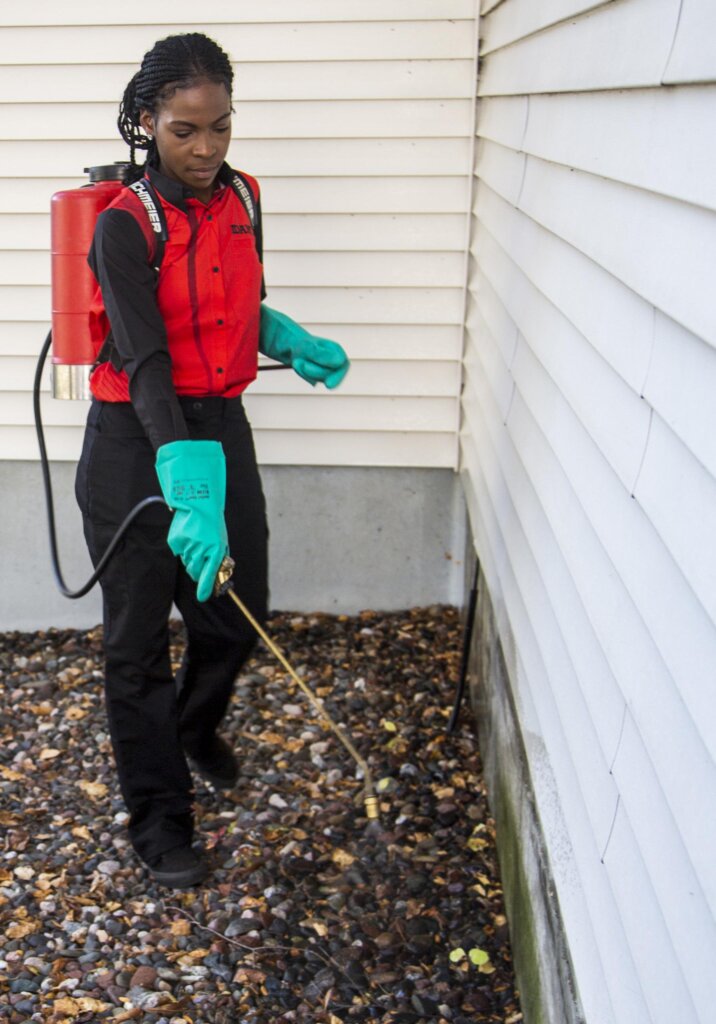Specialist A1 Portland Bed Bug Exterminator - Do Away With Bed Bugs Fast
Specialist A1 Portland Bed Bug Exterminator - Do Away With Bed Bugs Fast
Blog Article
Efficient Bug Control Services: An In-Depth Take A Look At Extermination Techniques and Avoidance Actions
In the world of pest control solutions, the successful administration of infestations calls for a thorough technique that combines numerous methods and actions for both removal and avoidance. From Integrated Parasite Administration (IPM) strategies that prioritize lasting options to chemical elimination strategies created for targeted removal, the toolbox versus bugs is complex and huge.

Integrated Pest Administration (IPM) Methods
Integrated Pest Management (IPM) Techniques include a detailed approach to pest control that focuses on control, surveillance, and prevention methods to efficiently manage bug populations. By integrating various methods, IPM intends to decrease the impact of bugs while additionally decreasing the dependence on chemical pesticides. Prevention lies at the core of IPM, emphasizing practices like proper cleanliness, maintenance of health, and securing entry indicate hinder parasites from infesting structures. Tracking plays an essential duty in IPM by routinely evaluating and identifying insect degrees to establish the proper treatment limits. Control approaches in IPM focus on the usage of physical, biological, and cultural methods prior to turning to chemical treatments as a last resort. These strategies include presenting natural killers, environment alteration, and using trapping gadgets to keep bug populaces in check. In general, IPM cultivates a lasting and environmentally conscious technique to pest administration, advertising long-term services that protect both human health and wellness and the community.
Chemical Elimination Techniques
Chemical extermination methods are frequently utilized in insect control services to efficiently eliminate parasite populaces that pose a risk to human wellness and property. These strategies entail using various chemical materials particularly designed to target and get rid of parasites such as pests, rats, and various other unwanted creatures. The application of chemicals, insecticides, rodenticides, and various other chemical representatives is thoroughly controlled to guarantee optimum efficiency while reducing threats to people, family pets, and the setting.
Among the key benefits of chemical extermination techniques is their capacity to provide fast and targeted outcomes, making them particularly helpful in cases of severe invasions or immediate bug control needs - a1 portland bed bug exterminator. However, it is necessary to highlight the relevance of correct handling, application, and disposal of these chemical products to stop unplanned injury
In addition, integrated insect management (IPM) techniques often incorporate chemical elimination strategies with various other techniques such as sanitation, habitat alteration, and organic controls to develop a extensive and lasting pest control method. By including chemical elimination methods carefully within an IPM structure, insect control solutions can properly handle insect populaces while lessening potential risks to human wellness and the environment.
Organic Parasite Control Techniques
Utilizing natural killers and parasites to take care of parasite populaces is a lasting approach understood as organic insect control. a1 pest control in portland oregon bed bugs. One usual biological control method involves introducing natural enemies of the target insect types, such official source as ladybugs for aphid control or nematodes for termite invasions.
One more efficient organic control technique is the usage of microbial insecticides. These are normally taking place bacteria, such as microorganisms, fungis, and infections, that especially target and infect particular parasite types. By utilizing these microbial representatives, bug populations can be properly minimized without creating or damaging beneficial microorganisms injury to home the setting.
Physical Parasite Prevention Measures
Carrying out physical insect avoidance measures involves using obstacles and structural adjustments to deter parasites from going into or infesting a residential property. Setting up door moves, screens on home windows, and sealing splits in the structure can assist prevent parasites like pests and rats from obtaining accessibility inside your home.
Another physical prevention measure is the use of obstacles like secure fencing to maintain larger bugs such as deer or raccoons away from the building. Mounting mesh or cable screens around yards can safeguard plants from being harmed by pests. Appropriate waste management, consisting of protecting wastebasket with tight-fitting lids, is important in deterring insects like insects, raccoons, and rodents. By applying these physical bug avoidance measures, home owners can dramatically minimize the risk of parasite invasions and the damages they can trigger.
Specialist Bug Examination Treatments
Conducting detailed and methodical insect inspections is an essential aspect of expert bug management protocols. Specialist pest assessors are trained to diligently analyze homes for indicators of problems, recognizing pest species, access points, and favorable problems. The evaluation process generally begins with a thorough analysis of both the inside and exterior of the premises. This entails monitoring for parasite droppings, nibble marks, nests, and any kind of structural damage that may show parasite activity. Additionally, inspectors may utilize specialized devices such as moisture meters and borescopes to detect hidden invasions within walls or crawl spaces.

Conclusion
Finally, effective insect control solutions use a variety of strategies, including Integrated Pest Management strategies, chemical extermination approaches, organic controls, and physical prevention procedures. Specialist parasite inspection procedures play an essential function in identifying and attending to pest issues in a timely fashion. By executing a mix of these techniques, homeowner can effectively prevent and handle parasite invasions.
From Integrated Insect Management (IPM) approaches that prioritize sustainable options to chemical extermination methods created for targeted removal, the arsenal versus parasites is diverse and huge.Integrated Parasite Monitoring (IPM) Strategies include an extensive method to pest control that concentrates on control, surveillance, and prevention techniques to effectively take care of insect populations.Chemical extermination techniques are typically utilized in insect control services to efficiently remove pest populations that position a danger to human health and wellness and building.Employing all-natural killers and bloodsuckers to handle insect populations is a sustainable method recognized as organic pest control.In conclusion, efficient bug control services utilize a variety of methods, including Integrated Pest Administration strategies, chemical extermination techniques, organic controls, and physical prevention measures.
Report this page